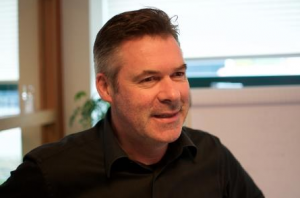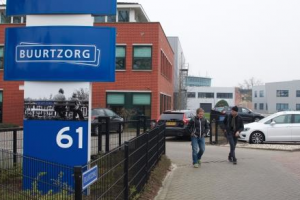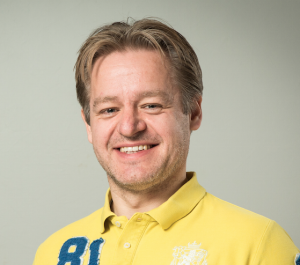by Mathias Holmgren for Enlivening Edge
Buurtzorg has decided to transform a bankrupt company in the social homecare services sector. Of the 11,000 -12,000 people who worked in the company when it failed, about 3,000 will be taken over by Buurtzorg.
This is a big effort. The employees included in this transformation are all frontline staff.
“We are the two opposites. They are very top down. They used to be in the cleaning market and then went into home care, but they did not do it very well.
To build a healthy, sustainable organization we need to transform this organization. We are going to work with self-organization. We don’t take over the management structure and back office.” (This and all quotes below unless otherwise attributed are from Jos de Blok.)
Buurtzorg coaches will train these people to operate using their organizational model. All support functions will come from Buurtzorg’s head office.
“We will make it non-profit. It was for-profit before and this was a problem. They focused too much on making profit, by delivering activities instead of delivering good care and creating good circumstances. It will not be about cleaning or any other activity. We will make it about supporting people in need of support.”
 I am visiting the Buurtzorg head office in the Netherlands. There is no reception desk, just a colorful hand painted sign stored under the stairs that we notice as we are welcomed by Jos de Blok, founder of Buurtzorg
I am visiting the Buurtzorg head office in the Netherlands. There is no reception desk, just a colorful hand painted sign stored under the stairs that we notice as we are welcomed by Jos de Blok, founder of Buurtzorg
For Buurtzorg, care was never primarily about the numbers, although they do outperform the industry average by about 40 %.
No, what Jos de Blok wants to tell us about is the stories their clients sent to them. They are collecting some of them for a book celebrating their ten-year anniversary. This is an example from an old lady.
“I stepped over from another care giver to Buurtzorg. I could only enjoy the Buurtzorg nurses for four days. I could help myself again. Before that, for three years I had somebody coming every morning and every evening. I thought that was the only way I could be helped.
Now I am independent again!”
To Jos and his colleagues, this is the difference in outcome between focusing on performing activities compared to focusing on the real needs and solving problems.

Buurtzorg Today
Close to 10,000 people now work within Buurtzorg, and the organization is still growing. Every month 400 new nurses apply to join the organization.
“We now have 850 teams. I would not be surprised if in two years we have doubled.”
As a stark contrast to the size of the rest of the organization, the head office is only 45 people, including Jos de Blok. Fifteen of those are team coaches.
That’s not much overhead. Not only is it enough to support all teams today, but apparently also to support their next step.
Beyond Nursing
The general population in the Netherlands knows about Buurtzorg and clients often want to try their services because of recommendations from relatives and friends.
The goodwill does not stop there. All political parties now support Buurtzorg and even encourage other similar sectors to consider using their model.
“Buurtzorg has become associated with something “good” now, so it is easier for us nowadays. There is good word of mouth.”
Jos de Blok was in Japan not long ago and was welcomed with big interest from public health officials. They had even created a magazine to tell the story of Buurtzorg, in Japanese. With an amused smile, Jos shows us a copy of a glossy weekend-type magazine covered with Japanese characters.
“It sold out, so there are no more copies.”
Recently there were inquiries from people in Canada, to discuss how to transform the Canadian health sector. Representatives from Mexico, Ukraine, Spain, India, UK, Belgium, and many more countries have reached out or are already collaborating.
It seems the whole world is after Jos de Blok like he was a wanted man, and perhaps in a way he is. When you have a reputation for solving problems, sometimes people come to you. This is how the next big step for Buurtzorg started.
“When the message came that this organization was going bankrupt, this was something that we had already warned them about. I have a very close relationship with the relevant government minister. I said if you want to change something, this is the moment.
The union phoned me. The minister phoned me. The municipalities said, we think the best option is that you are taking over this organization. But of course, not everybody was happy about this, because there is also a big risk.”
So naturally, Jos de Blok and Buurtzorg had to ask themselves: Can we transform a large social services company? Is it the right thing for us to do?
I ask: How did you make this decision?
He explains that it was not easy. It was discussed extensively in meetings. A lot of things came up.
“My wife said, ‘Why are you doing this? This is silly.’ Others said, ‘What about our reputation?’”
Yes, what about that reputation? What about those close relationships with politicians and health care officials, the high trust and regard from the Dutch general public? Wouldn’t the safe thing be to stick to your successful business?
“In the meetings with friends, as an organization with this reputation, what comes with it is you need to take responsibility for what you see. If you can use the experience and improve the situation for people and on the system as a whole we can change the system in the end.
The decision was made by me in the end, after agreement with and consultation with my friends.”
We ask who he means by his friends. He explains that these are his closest and most trusted colleagues. They are some of the people who helped build Buurtzorg and who will be involved with training and supporting the teams.
“We have a discussion on the Buurtzorg web. A lot of teams are responding that they are proud that we are doing this. We have vision meetings and I said that the first thing we are going to do is to raise the salaries in the new organization. I got a big applause. I focus a lot on the solidarity. We should build a lot on values.
Everybody is asking now: How can we help? We have teams all over the country asking if there are new teams coming from this organization in their region that they can help. There is a very positive response. There is a lot of pressure here in our head quarters, but we will manage.”
I ask: Does this shift the organizational purpose for Buurtzorg?
“Our ideas of what the purpose should be, this fits very well. We focus on
- Self support
- Creating networks
- Good working conditions
- Sustainable, healthy neighborhood
- Supporting the infrastructure in the community
If the nurses are working from the perspective of healthy communities and self-support and the social care organisation is doing the opposite, then there is a lot of tension.
“All these problems with health issues need to be approached from the same vision.”
To Jos de Blok and his colleagues it seems clear that great health care is not possible without improving potentially the whole living situation of the patient. This is how their purpose naturally extends to supporting and strengthening the local social network and community.
When he puts it this way, it makes a lot of sense. The decision to transform a whole organization may look like a bold, separate move from the outside. But from their own inside this looks more like a natural progression which will also improve the health and resilience of local neighbourhoods.
Twenty-two municipalities decided to accept the offer Buurtzorg made. They agreed to a one-time fee to cover the costs of the transformation, and on a payment level that will be sustainable. Jos says: ‘We will not be working with municipalities that are underpaying’.
The work begins in March with training of the first 500-600 people.
Our visit is over and we are left to learn
It is a bold and beautiful new step. But I can’t help wondering where this will lead. Buurtzorg is already the dominant provider in the sector of home nursing and still growing fast. Now they are extending their model to the first sector outside of nursing.
If their model succeeds also for this, how far will it go?
“In five years I think all of this will be in the public domain. We may need to find another balance between public and private in health care. I have no problem with private. But we should find another way to deal with these things in social enterprises”.
I wish I could say that I know what that means, but I can’t. Maybe Jos de Blok does not exactly know either, and maybe none of us really has to know.
 Maybe what matters more is that the system-change, that the four people who founded Buurtzorg envisioned, has gained momentum and may have barely begun.
Maybe what matters more is that the system-change, that the four people who founded Buurtzorg envisioned, has gained momentum and may have barely begun.
 Mathias Holmgren says: I work as an agile consultant for HiQ in Stockholm, Sweden. I help teams and organizations deliver great products by leading software development teams or by coaching teams and organizations. I have about 19 years of practical experience of software product development. I have also been a regular contributor for the Reinventing Organizations Wiki since that effort started almost a year ago. [email protected]
Mathias Holmgren says: I work as an agile consultant for HiQ in Stockholm, Sweden. I help teams and organizations deliver great products by leading software development teams or by coaching teams and organizations. I have about 19 years of practical experience of software product development. I have also been a regular contributor for the Reinventing Organizations Wiki since that effort started almost a year ago. [email protected]




